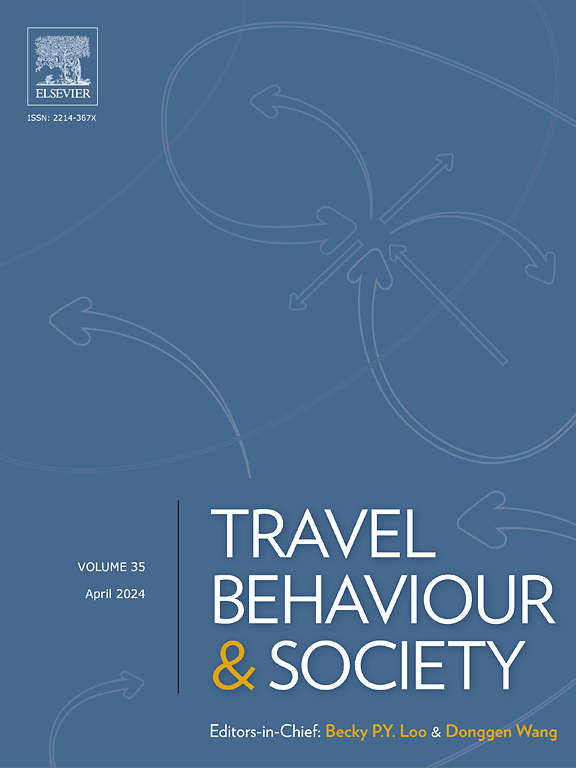Using a Simulation and Optimisation decision support tool to evaluate impacts of an intermodal travel management system combining ride-pooling and public transport
IF 5.1
2区 工程技术
Q1 TRANSPORTATION
引用次数: 0
Abstract
This paper explores using a decision support tool, an already developed and preliminary tested system with highly parameterised Simulation and Optimisation engines. This tool manages the assignment of user requests to an intermodal transport system in which conventional transit transportation modes, buses, subways, railways, and trams, are complemented and coordinated with a ride-pooling service. The main objective of this paper is to evaluate the suitability and sustainability of the intermodal transport system in terms of the reduction of emissions, number of conventional trips, and the policies efficiency depending on variable fleet sizes, detour penalties sensibility and fares. The computational tests have been conducted with a realistic Barcelona Metropolitan Area model. The results indicate a significant reduction in emissions with the implementation of ride-pooling services, both in multimodal and intermodal approaches, contributing to alleviating urban traffic congestion caused by private vehicles. A second contribution is the development and evaluation of a policy for the detour reduction of the services assigned to the requests, resulting in better routes with a smaller increase of the fare for already en-route passengers. Furthermore, the implementation of a variable active fleet policy involving a gradual adjustment of the operating number of vehicles during the start-up and shutdown of the system proves to be beneficial for the company in mitigating the system’s operational costs, especially in periods of lower demand, where maintaining a full-time fleet would incur in unnecessary expenses given the limited number of requests.
使用模拟和优化决策支持工具来评估拼车和公共交通相结合的多式联运旅行管理系统的影响
本文探讨了使用决策支持工具,一个已经开发和初步测试的系统,具有高度参数化的模拟和优化引擎。该工具管理用户对多式联运系统的请求分配,在多式联运系统中,传统的运输方式,如公共汽车、地铁、铁路和有轨电车,与拼车服务相补充和协调。本文的主要目的是评估多式联运系统在减少排放、常规行程数量和政策效率方面的适用性和可持续性,这取决于不同的车队规模、绕行处罚敏感性和票价。利用巴塞罗那市区的实际模型进行了计算试验。结果表明,在多式联运和多式联运方式中,拼车服务的实施显著减少了排放,有助于缓解私家车造成的城市交通拥堵。第二个贡献是制定和评价了一项政策,以减少分配给请求的服务的绕行,从而为已经在途中的乘客提供更好的路线,费用增加较少。此外,在系统启动和关闭期间逐步调整车辆运行数量的可变主动车队政策的实施,对公司减轻系统的运营成本是有益的,特别是在需求较低的时期,在有限的请求数量下,维持一个全职车队会招致不必要的费用。
本文章由计算机程序翻译,如有差异,请以英文原文为准。
求助全文
约1分钟内获得全文
求助全文
来源期刊

Travel Behaviour and Society
TRANSPORTATION-
CiteScore
9.80
自引率
7.70%
发文量
109
期刊介绍:
Travel Behaviour and Society is an interdisciplinary journal publishing high-quality original papers which report leading edge research in theories, methodologies and applications concerning transportation issues and challenges which involve the social and spatial dimensions. In particular, it provides a discussion forum for major research in travel behaviour, transportation infrastructure, transportation and environmental issues, mobility and social sustainability, transportation geographic information systems (TGIS), transportation and quality of life, transportation data collection and analysis, etc.
 求助内容:
求助内容: 应助结果提醒方式:
应助结果提醒方式:


